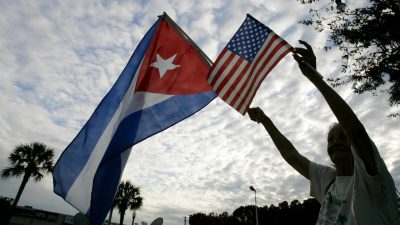US, Cuba to Restart Talks on Law Enforcement: State Department
Reuters cites a source as saying that US-Cuba talks on law enforcement are expected to take place next week for the first time since 2018.

All Global Research articles can be read in 51 languages by activating the Translate Website button below the author’s name.
To receive Global Research’s Daily Newsletter (selected articles), click here.
Follow us on Instagram and Twitter and subscribe to our Telegram Channel. Feel free to repost and share widely Global Research articles.
***
The US State Department said on Thursday that the Biden administration is planning to send a delegation to Havana this month to restart US-Cuba talks on law enforcement that were suspended under former President Donald Trump.
A State Department spokesperson indicated that US concerns about counterterrorism will be among the subjects addressed.
Shortly before his term ended in January 2021, Trump placed Cuba on the so-called US list of “state sponsors of terrorism,” and the Biden administration has been reviewing this since taking office.
The meeting will be the first of its kind since the law-enforcement dialogue, which was started in 2015 under former President Barack Obama, was stopped in 2018 under Trump.
In a statement, the State Department spokesperson considered that “this type of dialogue enhances the national security of the United States through improved international law enforcement coordination, which enables the United States to better protect U.S. citizens and bring transnational criminals to justice.”
However, the official noted that “this dialogue does not impact the administration’s continued focus on critical human rights issues in Cuba.”
The spokesperson said the talks provide “a forum to raise difficult matters and convey our concerns directly to the Cuban government.”
Reuters cited a source in Washington familiar with the matter as saying that the talks were expected to take place next week and are expected to focus on combating cybercrime, terrorist threats, and drug trafficking, among other issues.
According to the source, the US delegation will have representatives from the State Department, National Security Council, and Justice Department, including the Federal Bureau of Investigation (FBI).
US reopening visa, consular services at Havana Embassy
In early January, the US consulate in Havana resumed full immigrant visa services for Cubans. The reopening comes amid a record exodus from Cuba to the United States, mainly by undocumented migrants, as Cuba suffers its worst economic crisis in 30 years due to Washington’s harsh unlawful sanctions imposed against the Caribbean island.
The US consulate in Havana was closed under the Trump administration after diplomatic staff and their families reportedly fell ill with symptoms later nicknamed Havana Syndrome.
Since Biden replaced Trump as President in 2021, several high-level meetings have sought to find a solution to the migratory standoff. In May last year, the consulate resumed “limited” visa services.
Cuba has been under US sanctions for 60 years. After a four-year relaxation during the presidency of Barack Obama, relations deteriorated under his successor Trump, who reinforced sanctions.
Despite election promises, Biden has not reversed the measures, in fact hardening his speech following US-backed anti-government riots on the island in July 2021.
Washington has kept Cuba on its so-called list of countries deemed “sponsors of terrorism” and recently added it to another of countries “undermining religious freedom.”
The Caribbean island nation was hit hard by the Covid-19 pandemic, which crippled its critical tourism sector. Remittances sent from abroad — which in 2019 reached $3.7 billion and is another vital source of income for Cubans — also largely dried up in recent years with travel blocked.
Cuban FM: US ignored UN vote to lift embargo on Cuba 29 times
It is noteworthy that during his speech at the UN General Assembly in New York in late November 2022, Cuban Foreign Minister Rodriguez Parilla decried the 60 years of US economic embargo against Cuba which he described as “vast, cruel and immoral.”
Parilla explained that “the government of the US is reinforcing pressure on banking institutions, companies, and governments throughout the world that are interested in establishing relations with Cuba, and the US continues to obsessively pursue all sources of foreign exchange coming into the country to bring about the economic collapse of the nation.”
The Cuban diplomat recalled that the UNGA had voted 29 times, with an overwhelming majority, to end the “ruthless and unilateral” embargo on Cuba, noting that the US ignored the assembly’s decision 29 times.
“Thirty years have now elapsed since the first general assembly voted against this blockade, and at this time, the US continues to ignore the almost unanimous demand from you to cease its illegal and brutal policy against Cuba,” Parilla indicated, urging the US to remove the Caribbean island from the list of “state sponsors of terrorism.”
*
Note to readers: Please click the share buttons above. Follow us on Instagram and Twitter and subscribe to our Telegram Channel. Feel free to repost and share widely Global Research articles.

